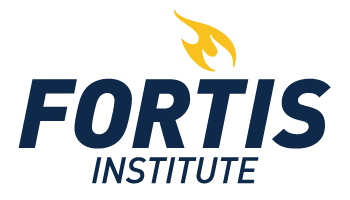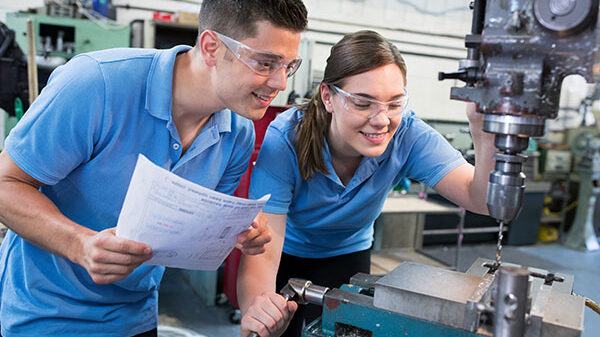Something for Everyone
Careers in construction are not only scalable but also in-demand. There’s no set path for everyone. You can begin as a general laborer then transition to a skilled tradesman through certification and on-the-job training. With unlimited entry points and plenty of room for growth, you’re bound to find a career path that’s right for you. Visit Employ Florida to search for local employment opportunities.
Electrician
Licensed electricians install, repair, and maintain commercial and residential lighting, security, and communication electrical control systems. This hands-on profession requires manual dexterity, normal color vision, and strong critical thinking skills. To become an electrician in Florida, you must complete a registered apprenticeship program supervised by a licensed electrician and pass a state licensing exam.
Minimum Required Education: High School Diploma/GED/On-the-Job Training
Average Local Salary: $45,760
Heating, Ventilation, and Air Conditioning Mechanic and Installer
Licensed heating, ventilation, and air conditioning (HVAC) professionals install, repair, and maintain commercial and residential heating, cooling, and refrigeration systems. To work in this profession in the state of Florida, you must be a licensed air conditioning contractor or a technician apprentice working under a licensed contractor. With the average Florida HVAC supervisor salary of $110,048 as of May 2020, the profession has significant growth potential.
Minimum Required Education: High School Diploma/GED/On-the-Job Training
Average Local Salary: $36,400
Plumbers
Plumbers assemble, install, and repair commercial and residential heating, water, and drainage systems. In most cases, to install new heating, water, or drainage systems in the state of Florida, you will need to be a licensed plumber or an apprentice working under a licensed plumber. As a master plumber and business owner, this profession has uncapped potential.
Minimum Required Education: High School Diploma/GED/On-the-Job Training
Median State Wage: $43,220
Carpentry
Carpenters construct, repair, and replace wood, steel, concrete, and composite structures. This may include but is not limited to framing walls and installing joists, windows, doors, insulation, drywall, trusses, cabinetry, and flooring. While a high school diploma is not a requirement for this field, reading comprehension and mathematic skills are necessary to perform basic tasks.
Minimum Required Education: On-the-Job Training
National Salary Range: $28,860 – $82,750
Welding
Welders, cutters, solderers, and brazers work extensively in joining and repairing metal beams and piping in major infrastructure like high-rise buildings, dams, and bridges. They also assist in the setup and repair of electrical, plumbing, and ventilation systems in residential and commercial construction. To work in this career path, a valid certificate in welding from an accredited institution is preferred and often required to work with major infrastructure.
Minimum Required Education: On-the-Job Training
National Median Salary: $44,190 per year
Masonry
Brickmasons and blockmasons work with concrete, stone, and other raw material to build and repair a wide range of sturctures, including foundations, pathways, driveways, walls, and floors. Masonry doesn’t require a high school diploma or GED; therefore, it provides a great entry point for those who enjoy working with their hands and desire to work in construction.
Minimum Required Education: On-the-Job Training
National Median Salary: $47,710 per year
Data Source: Employ Florida and/or the U.S. Bureau of Labor Statistics as of June 22, 2021.
Skilled Trades Career Pathways
High School Diploma or GED
General Laborer $11-$13/hr
Installation, Maintenance & Repair $13-$16/hr
Certificate/Apprenticeship
Skilled Tradesman (HVAC, Electrician, Plumber) $15-$18/hr
2-Year Degree (AA/AS) Plus Work Experience
First-Line Supervisor $22-$26/hr
4-Year Degree (BA/BS)
Project Manager $25-$30/hr
Master's/Doctorate Degree
Owner
Earn More with Interest
The O*NET® Interest Profiler™ provides users with a list of careers based on a 60-question interest inventory, which is broken down into six categories: Realistic, Investigative, Social, Enterprising, Conventional, and Artistic. Careers related to each cluster are further broken down into one of five job zones to illustrate the length of preparation needed in terms of education, training, and experience to pursue that career path.
Local Training Providers
Indian River State College
Indian River State College is home to five campuses and six educational centers located throughout St. Lucie, Indian River, Martin and Okeechobee counties. Accredited though the Southern Association of Colleges and Schools Commission on Colleges, IRSC offers a broad selection of associate and baccalaureate degrees and certifications.

Treasure Coast Technical College

Florida Training Services, Inc.
Fortis Institute
Fortis offers career training programs in a variety of career fields. Locally, the Heating, Ventilation, Air Conditioning and Refrigeration (HVAC) program at Fortis’s Port St. Lucie campus prepares students for entry-level employment as an HVAC Technician.

Keiser University
Keiser University is accredited by the Southern Association of Colleges and Schools Commission on Colleges. While Keiser doesn’t offer any formal training in skilled trades, the university does offer advanced degree progams in business administration that may benefit those looking to start their own business within this in-demand industry.
%
of employers recommend apprenticeships as a training model.
%
of apprentices are still employed nine months after completion.
.
%
Apprentices earn 2.5% more over the course of their careers.
Local Registered Apprenticeship Programs
A registered apprenticeship program is a great way to gain the skill set you need to kick start your career or advance in your current position. On average, apprentices earn about $300,000 more than their counterparts over the course of their career. Learn more about apprenticeship opportunities along the Treasure Coast.
IRSC Electrical Apprenticeship
This program is delivered in partnership with State of Florida registered apprenticeship sponsors, and prepares students for advancement in the construction industry. The apprenticeship program utilizes on-the-job training and classroom instruction, providing the student with theoretical and practical skills necessary in the electrical trades.
Florida East Coast Electrical JATC
Registered Apprenticeship
Registered apprentices will accumulate 8,000 hours of on-the-job training and successfully complete five years of related electrical training. Those who successfully complete the program will earn their journeymen electrician certification.
Palm Beach County Ironworkers JATC Registered Apprenticeship
During this four-year program, registered apprentices will accumulate 8,000 hours of on-the-job training and successfully complete 816 hours of classroom training.
Carpentry Apprenticeship Program
Florida Training Services offers (3) program options: (1) Framing and Finishing, (2) Concrete Forms and Wood Working, and (3) Carpentry Program. Apprentices will log a minimum of 2,000 hours per year of on-the-job training (OJT) and a minimum of 144 hours per year of related classroom instruction.
Skilled Construction Trades Apprenticeship
Pipe U is The Palm Beach County Plumbing, Air Conditioning and Pipefitting Apprentice Program sponsored by U.A. Local 630 and participating businesses. During the 60-month (5-year) program, which combines 40 hours of on-the-job training of and two nights of classroom instruction per week. Tuition is free tuition.
Testimonials
“I like being out in the field, working with my hands, building stuff, fixing things. It’s hard work, but if you enjoy hands on and learning something new every day, then it’s a great field to get into. You can always move up. It’s never a dead-end job.”
“The construction industry provides so many growth opportunites. When I started, I started as an apprentice. I would encourage other people to join the world of construction because there’s so many different things you can do and different trades you can try, and the possiblities are endless. You can start out on something like electrical or roofing, and if you feel that is not the right fit for you, you can transition to something else like carpentry or plumbing.”
“For the longest time I had planned to go to college, but I just didn’t know what degree to go for and then I was like ‘I’m going to take that apprenticeship. I’m going to see what they can do for me,’ and they put me through school. They showed me the ropes, and they’re teaching me everything I need to be successful in and out of work.”
In-Demand Career Pathways
Skilled Trades
Careers in construction are not only scalable but also in-demand. There’s no set path for everyone. You can start out as a general laborer then transition to a skilled tradesman through certification and on-the-job training. With unlimited entry points and plenty of room for growth, you’re bound to find a career path that’s right for you.
Healthcare
With a broad range of career paths, skill sets, and educational requirements, a career in healthcare offers unmatched emotional and financial rewards with plenty of room for growth. Career fields include administration, diagnostics, pharmacy, dentistry, nursing, medical research, and more.
Manufacturing
Historically, a career in manufacturing has been hands-on, but the 21st century production line demands less physical labor and more critical thinking. Digitization and advancements in robotics have led to an increased demand for higher skill, higher-wage jobs, which often require certifications and/or degrees for this higher level of performance.





